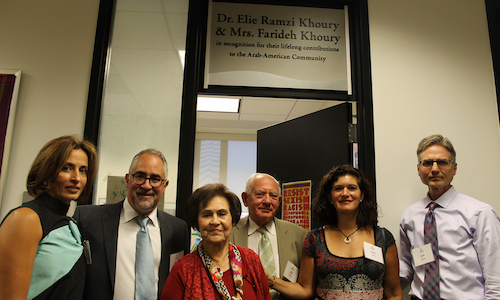
Nabil Khoury (’85 B.S.) vividly recalls spending many hours as a youth working with his dad in their garage, packing medical supplies and equipment to send to the war-torn Middle East.
“My father, who is now a semi-retired physician, supported humanitarian efforts in areas of conflict,” said Khoury, attending physician in the Department of Emergency Medicine at St. Mary Mercy Hospital in Livonia, Mich., and medical director of the Together Health Network. “He even helped equip intensive care units at hospitals in places like Lebanon. My mother co-wrote an Arabic cookbook. Funds from the thousands of copies sold supported similar humanitarian causes.”
Khoury’s parents—Elie Razmi Khoury and Farideh Khoury—immigrated to the U.S. from the Middle East in the early 1960s. They engaged in charitable causes tirelessly for decades, without fanfare, never seeking credit.
But recognition came in September, following a significant gift by Khoury, his wife, Mouna, and sister, Dina Khoury Hanby (’91 B.A.) to UM-Dearborn’s Center for Arab American Studies (CAAS). Donor gifts helped CAAS secure a prestigious $100,000 National Endowment for the Humanities challenge grant. In recognition of the Khoury’s gift, the center named its office space in honor of Elie and Farideh Khoury for their lifelong contributions to the Arab American community.
“The naming is a validation of all the good things they’ve done in their lives,” Khoury said of his parents. “We wanted to honor them, to let them know we and the community deeply appreciate all the charitable work they did for others.”
Earlier this fall, CAAS and UM-Dearborn honored Khoury’s parents with a special office name plaque unveiling ceremony. Among the nearly 70 attendees were family members, friends, community members, UM-Dearborn students and administrators, and CAAS staff. Speakers included Khoury; UM-Dearborn Chancellor Daniel Little; College of Arts, Sciences, and Letters Dean Martin Hershock; and CAAS Director and Associate Professor of History Sally Howell.
Founded in 2001, CAAS promotes the understanding of the Arab American history and experience, including Arabic-speaking immigrants to the United States.
“The center has three goals,” said Howell. “To offer classes on the history, culture and political concerns of the Arab American community, to encourage and support research on Arab American topics, and to connect the campus and our students with the Arab American community through partnerships with service organizations.”
The center currently offers a minor and a certificate program in Arab American Studies. The NEH grant will help create an endowment for the center, supporting a full range of scholarly, academic and community activities. This includes a new class for the Winter 2018 semester: “Public Cultural Work in Arab Detroit.” The course will allow students to explore different approaches to public humanities work and engage in intensive research with a local cultural institution. Students will also have the opportunity to present their findings publicly.
“NEH grants are very competitive and prestigious,” Howell said. “To receive one is strong acknowledgement that the center’s activities are relevant, important and moving in the right direction. Now, we want to grow the endowment so we can continue to expand the center and its offerings for students.”
Khoury said his family’s long history of activism motivated him to support the center and enhance its academic presence.
“We want the center to be a point of light—an institution representing the best of Arab American culture,” Khoury said. “It will be a place where people study and discuss our culture so Arab Americans can take pride in who we are and what we offer to our country.”
Visit the Center for Arab American Studies website to learn more about the center and ways to support it.




